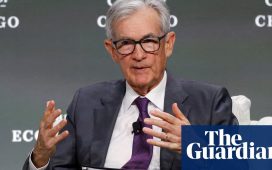Key events
Closing summary
Downing Street is hopeful that a deal to end the rail strikes could be possible. A No 10 source said that while issues remained to be sorted, it was viewed as the public sector dispute most likely to be resolved first, reports our political correspondent Peter Walker.
Network Rail’s chief negotiator, Tim Shoveller, has claimed a deal to stop the strikes is “in touching distance”, as drivers and staff began the first of five consecutive days of national rail strikes. Most train services are not running today.
Shoveller suggested the pay offer on the table (which has been rejected by the RMT union) would not be improved but claimed that better communication of the deal would begin to win over union members.
However, RMT leader Mick Lynch said the strikes could continue beyond May, unless a reasonable offer is made to the RMT. The transport secretary, Mark Harper, denied that ministers had been sitting on their hands, and insisted that the current offer was “fair and reasonable” and that reforms to the railway needed to be made in return, i.e. changes to working conditions.
You can read more on our politics live blog:
German inflation slowed to 8.6% in December.
Manufacturing in the UK ended 2022 on a weak footing, with production, new orders and employment all falling at faster rates. The S&P Global / CIPS UK manufacturing purchasing managers’ Index fell to a 31-month low of 45.3 in December, down from 46.5 in November but above the earlier flash estimate of 44.7. Manufacturing activity has been declining for five months.
In the US, factory activity declined at the fastest rate since May 2020 last month, while inflationary pressures also eased. The S&P Global PMI fell to 46.2 in December. Any reading below 50 indicates contraction.
Natural gas prices are falling because of mild weather, reducing the risk of power cuts this winter.
Our other main stories today:
Thank you for reading. We’ll be back tomorrow. Happy New Year! – JK

Peter Walker
There is still no timetable for details about the government’s plans to pass a law to make public sector strikes more difficult, for example by imposing statutory minimum service standards for railways, reports Peter Walker.
No 10 had originally hoped to provide information on this before Christmas, but this is now not likely even this week, with officials still examining the complexities of the issue.
Rishi Sunak’s official spokesman said:
We certainly want these new powers to be brought in as soon as possible. While I don’t have a specific timescale for you, we recognise the urgency of this and are working as such.
Downing Street hopeful that a deal to end rail strikes is possible
Downing Street is hopeful a deal to end the rail strikes could be possible. A No 10 source said that while issues remained to be sorted, it was viewed as the public sector dispute most likely to be resolved first, reports our political correspondent Peter Walker.
US factory activity declines at fastest rate since May 2020
In the US, factory activity declined at the fastest rate since May 2020, and among the sharpest since 2009, a survey showed. On a more positive note, inflationary pressures also eased.
The final manufacturing PMI survey from S&P Global showed a fall to 46.2 in the main index in December from 47.7 in November, matching the earlier ‘flash’ estimate. Any reading below 50 indicates contraction.
Lower prices for some inputs such as metals and fuel led to the slowest uptick in cost burdens since July 2020. In an effort to drive sales and pass on cost savings, firms hiked their selling prices at the softest pace for just over two years.
Siân Jones, senior economist at S&P Global Market Intelligence, said:
The manufacturing sector posted a weak performance as 2022 was brought to a close, as output and new orders contracted at sharper rates. Demand for goods dwindled as domestic orders and export sales dropped. Muted demand conditions also led to downward adjustments of stock holdings, as excess inventories built earlier in the year were depleted in lieu of further spending on inputs. With the exception of the initial pandemic period, stocks of purchases fell at the steepest rate since 2009.
Concerns regarding the outlook for demand weighed on hiring decisions. Job creation was only slight, and largely linked to skilled hires, as firms displayed caution.
Sinking demand for inputs and greater availability of materials at suppliers led to a further easing of inflationary pressures. In fact, the rate of input price inflation fell below the series trend. Selling price hikes also eased, albeit still rising steeply. Slower upticks in inflation signal the impact of Fed policy on prices, but growing uncertainty and tumbling demand suggest challenges for manufacturers will roll over into the new year.
Crypto billionaire Bankman-Fried to plead not guilty
Fallen crypto billionaire Sam Bankman-Fried is expected to enter a plea of not guilty on Tuesday to criminal charges that he cheated investors and looted billions of dollars at his now bankrupt FTX cryptocurrency exchange, according to a source familiar with the matter.
Bankman-Fried is accused of illegally using FTX customer deposits to support his Alameda Research hedge fund, buy real estate and make millions of dollars in political contributions, in what prosecutors have called a fraud of epic proportions.
He is scheduled to appear at 2pm ET (7pm GMT) before US district judge Lewis Kaplan in Manhattan.
Aldi sales up 26% as shoppers seek savings
Aldi enjoyed its best Christmas ever with a 26% rise in sales in December year-on-year, as it opened new stores in the UK and attracted more customers looking for savings amid the cost of living crisis.
Aldi UK, a subsidiary of the German discount supermarket group, pledged to offer shoppers the lowest grocery prices in the UK this year “no matter what”.
The company, which has more than 990 stores and a 9.3% slice of the UK grocery market, overtook Morrisons last year to become Britain’s fourth-biggest supermarket group.
It highlighted strong growth in sales of fresh meat such as poultry and pork, which were both up more than 28%. Total sales topped £1.4bn in December for the first time.
Sales of chilled desserts and fresh cheeses jumped by almost 30% and 50% respectively, while sales of snacks such as crisps and nuts rose more than 40% as the men’s football World Cup coincided with the run-up to Christmas for the first time.
Aldi and fellow German discounter Lidl have expanded rapidly in Britain in recent years, forcing the market leader Tesco, along with Sainsbury’s, Asda and Morrisons to compete more on price. Tesco and Sainsbury’s have pledged to match Aldi on key products.

In corporate news, the bankrupt chain Cineworld has denied it attempted to break up the business and sell some of its cinemas to the owner of its rival Odeon, insisting it was holding out hope for a buyer interested in acquiring the entire business.
The denial comes after reports claimed the world’s second-largest cinema chain, which filed for bankruptcy protection in the US in September, had been in talks to offload some of its cinemas in the US and Europe to AMC Entertainment.
“Cineworld would like to clarify that neither it nor its advisers have participated in discussions with AMC Entertainment Holdings Inc regarding the sale of any of its cinema assets,” the company said on Tuesday. It also denied that any of its lenders were in talks with the Odeon owner.
The British cinema firm, which also owns the Picturehouse brand, emphasised it was focused on selling the business as a whole, rather than seeking buyers for individual assets, and planned to approach interested parties later this month.
German inflation slows to 8.6%
In Germany, Europe’s biggest economy, inflation has slowed. The inflation rate fell to 8.6% in December, according to provisional official figures, from 10% in November and 10.4% in October.
Food prices were still 20.7% higher, though, compared with 21.1% in November, while energy costs rose by 24.4%, down from November’s 38.7%, because of support measures from the government.
Mild weather sends gas prices lower

Alex Lawson
A spell of mild weather in the UK and Europe has sent wholesale gas prices tumbling in a respite from the high prices that have led to soaring energy bills.
European prices for delivery in February fell by 4.3% to €73.7 a megawatt hour while UK prices fell by 3.8% to 179p a therm.
Recent milder weather has reduced demand for heating in the UK and the rest of Europe and conditions are expected to remain mild for the next two weeks.
The situation has increased optimism over gas supplies, which have been stretched since Russia reduced gas exports to Europe after its invasion of Ukraine. Last week prices dipped to levels not experienced before the start of the war, in February 2022.
The RMT leader said he understands frustration over the strikes but advised disgruntled commuters to also “look at what the government and the companies are doing”.
Speaking from a picket line at London’s Euston station, Mick Lynch told PA that the rail companies cannot run services properly on non-strike days, let alone on days when industrial action is being taken.
Lynch said there was “very strong support” among the public for the walkouts but acknowledged not all people felt the same way.
We understand that anger and that frustration, and we understand why they might blame us, but they should also look at what the government and the companies are doing.
We want to get the railway back to normal. We want good industrial relations and we want the services to run the way they should be running.
The companies can’t run them on non-strike days, never mind when we’re out. So, we need to change the equation and get a settlement to the dispute as quickly as possible, and that will mean the public can rely on the railway and get the services they need.
RMT chief: Strikes to continue beyond May unless reasonable offer is made
The RMT general secretary, Mick Lynch, has said industrial action will need to continue beyond May unless a reasonable offer is made to the RMT.
They (the strikes) are likely to go ahead if there’s no offer that we can work on.
We would like to get into a situation where we’re negotiating constantly with the companies and where we didn’t have to have strike action, and then work up a settlement that our members could vote on and accept.
But if we don’t get that there will have to be more action, and we’ve got a mandate that runs through to May this year, and if we have to go further, that’s what we’ll need to do. We don’t want that, though.
As the first of five strikes began today, he added:
Our members are taking action right across the country, from the north of Scotland to the tip of Cornwall. The railway service has ground to a halt and it will be severely disrupted this week – we don’t take any pleasure in that.

Lynch also said that thousands of workers would have lost their jobs and safety would be endangered if the RMT accepted the latest offer from train companies.
Speaking from a picket line at Euston station in London, the union leader told PA:
The one on the train operating companies we could never accept, because that would mean thousands of our members and guards would lose their jobs, that would mean a less safe railway and it would also have meant we’d have to accept a pay offer that is way below last year’s inflation, and this year’s inflation, 2023.
We’ve also not had a pay rise in three years, so you’re looking at a three, four, five-year deal that would have been unacceptable to our members and unacceptable to the union, so it wasn’t a tangible offer that we could have gone forward with.
RMT boss: Ministers ‘enjoying the holidays’
A new wave of UK rail strikes began this morning, and the war of words between the government and unions heated up. While transport secretary Mark Harper said the union should return from the picket lines to the negotiating table to “hammer out a deal,” RMT chief Mick Lynch told the PA news agency:
I’ll come and meet the transport secretary whenever he wishes to – I could meet him in 20 minutes. If he wanted me to come off this picket line I would do that, so immediately.
What has happened is we had a meeting with the railway secretary on December 15, and we’d already given notice of action, and they’ve done nothing since that time, over Christmas, enjoying the holidays.
We were available to meet and they didn’t want to meet us. So they’ve waited until the strikes come to make these noises, but if they’d wanted to get a settlement and get the strikes off, they could have taken a bit more action and got things moving.









